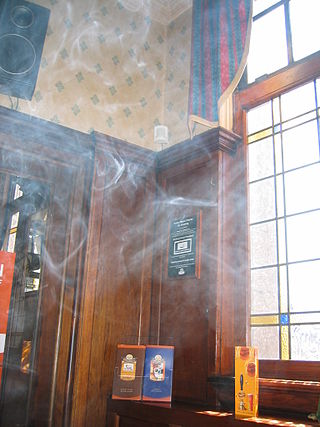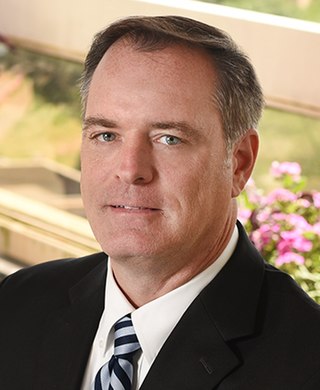
Polytetrafluoroethylene (PTFE) is a synthetic fluoropolymer of tetrafluoroethylene, and has numerous applications because it is chemically inert. The commonly known brand name of PTFE-based composition is Teflon by Chemours, a spin-off from DuPont, which originally discovered the compound in 1938.

Passive smoking is the inhalation of tobacco smoke, called passive smoke, secondhand smoke (SHS) or environmental tobacco smoke (ETS), by individuals other than the active smoker. It occurs when tobacco smoke diffuses into the surrounding atmosphere as an aerosol pollutant, which leads to its inhalation by nearby bystanders within the same environment. Exposure to secondhand tobacco smoke causes many of the same diseases caused by active smoking, although to a lower prevalence due to the reduced concentration of smoke that enters the airway.

Perfluorooctanoic acid is a perfluorinated carboxylic acid produced and used worldwide as an industrial surfactant in chemical processes and as a material feedstock. PFOA is considered a surfactant, or fluorosurfactant, due to its chemical structure, which consists of a perfluorinated, n-heptyl "tail group" and a carboxylic acid "head group". The head group can be described as hydrophilic while the fluorocarbon tail is both hydrophobic and lipophobic.

Perfluorooctanesulfonic acid (PFOS) is a chemical compound having an eight-carbon fluorocarbon chain and a sulfonic acid functional group and thus a perfluorosulfonic acid. It is an anthropogenic (man-made) fluorosurfactant, now regarded as a global pollutant. PFOS was the key ingredient in Scotchgard, a fabric protector made by 3M, and related stain repellents. The acronym "PFOS" refers to the parent sulfonic acid and to various salts of perfluorooctanesulfonate. These are all colorless or white, water-soluble solids. Although of low acute toxicity, PFOS has attracted much attention for its pervasiveness and environmental impact. It was added to Annex B of the Stockholm Convention on Persistent Organic Pollutants in May 2009.

Endocrine disruptors, sometimes also referred to as hormonally active agents, endocrine disrupting chemicals, or endocrine disrupting compounds are chemicals that can interfere with endocrine systems. These disruptions can cause numerous adverse human health outcomes including, alterations in sperm quality and fertility, abnormalities in sex organs, endometriosis, early puberty, altered nervous system function, immune function, certain cancers, respiratory problems, metabolic issues, diabetes, obesity, cardiovascular problems, growth, neurological and learning disabilities, and more. Found in many household and industrial products, endocrine disruptors "interfere with the synthesis, secretion, transport, binding, action, or elimination of natural hormones in the body that are responsible for development, behavior, fertility, and maintenance of homeostasis ."
The American Council on Science and Health (ACSH) is a pro-industry advocacy organization founded in 1978 by Elizabeth Whelan with support from the Scaife Foundation and John M. Olin Foundation. ACSH's publications focus on industry advocacy related to food, nutrition, health, chemicals, pharmaceuticals, biology, biotechnology, infectious disease, and the environment. Its critics have accused it of being a front group for anti-science denialism.
Steven J. Milloy is a lawyer, lobbyist, author and former Fox News commentator. Milloy is the founder and editor of the blog junkscience.com.
Gio Batta Gori is an epidemiologist and fellow with the Health Policy Center in Bethesda, Maryland which he established in 1997 and where he specializes in risk assessment and scientific research. He was deputy director of the United States' National Cancer Institute's Division of Cancer Cause and Prevention, where he directed the Smoking and Health Program and the Diet and Cancer Program.
Per- and polyfluoroalkyl substances are a group of synthetic organofluorine chemical compounds that have multiple fluorine atoms attached to an alkyl chain; there are 7 million such chemicals according to PubChem. PFAS came into use after the invention of Teflon in 1938 to make fluoropolymer coatings and products that resist heat, oil, stains, grease, and water. They are now used in products including waterproof fabric such as Nylon, yoga pants, carpets, shampoo, feminine hygiene products, mobile phone screens, wall paint, furniture, adhesives, food packaging, heat-resistant non-stick cooking surfaces such as Teflon, AstroTurf, firefighting foam, and the insulation of electrical wire. PFAS are also used by the cosmetic industry in most cosmetics and personal care products, including lipstick, eye liner, mascara, foundation, concealer, lip balm, blush, and nail polish.

The Devil We Know is a 2018 investigative documentary film by director Stephanie Soechtig regarding allegations of health hazards from perfluorooctanoic acid, a key ingredient used in manufacturing Teflon, and DuPont's potential responsibility. PFAS are commonly found in every household, and in products as diverse as non-stick cookware, stain resistant furniture and carpets, wrinkle free and water repellant clothing, cosmetics, lubricants, paint, pizza boxes, popcorn bags, and many other everyday products.
The Center for Indoor Air Research was a tobacco industry front group established by three American tobacco companies—Philip Morris, R.J. Reynolds, and Lorillard—in Linthicum, Maryland, in 1988. The organization funded research on indoor air pollution, some of which pertained to passive smoking and some of which did not. It also funded research pertaining to causes of lung cancer other than passive smoking, such as diet. The organization disbanded in 1998 as a result of the Tobacco Master Settlement Agreement.
GenX is a Chemours trademark name for a synthetic, short-chain organofluorine chemical compound, the ammonium salt of hexafluoropropylene oxide dimer acid (HFPO-DA). It can also be used more informally to refer to the group of related fluorochemicals that are used to produce GenX. DuPont began the commercial development of GenX in 2009 as a replacement for perfluorooctanoic acid.

Michael L. Dourson is an American toxicologist and Director of Science at the nonprofit organization, Toxicology Excellence for Risk Assessment. He was formerly a senior advisor to the Administrator of EPA, and prior to that, a professor at the Risk Science Center at the University of Cincinnati College of Medicine. Prior to joining the University of Cincinnati, he was founder and president of the nonprofit Toxicology Excellence for Risk Assessment. Earlier in his career, he was employed by the Environmental Protection Agency Environmental Criteria and Assessment Office, among other assignments.
Good Epidemiological Practices or Good Epidemiology Practices (GEP) was a set of guidelines produced by the U.S. Chemical Manufacturers Association (CMA) in 1991 to improve epidemiologic research practices. It was then adopted by the tobacco industry around 1993 as part of its "sound science" program to counter criticisms of the industry on health and environmental issues such as secondhand smoke. It failed to make much impact on the US and European regulators, but may have had more influence in its later manifestations in Asia and particularly China.

Iqos is a line of heated tobacco and electronic cigarettes manufactured by Philip Morris International (PMI). It was first introduced in November 2014 in Japan and Italy. Most of the IQOS products are devices that heat tobacco without burning it.
Dennis J. Paustenbach PhD, CIH, DABT, is an American scientist, businessman, researcher, and author. Dennis is currently President of Paustenbach and Associates, which is a consulting firm who uses risk assessment techniques to characterize occupational and environmental health hazards. He is the founder and former president of ChemRisk, a consulting firm specializing in the use of toxicology and risk assessment to characterize the hazards of chemicals in soil, air, water, food, sediments and consumer products. He was, for about 4 years, a Group Vice-President of Exponent.
ChemRisk is a Delaware Limited Liability Company, a for-profit scientific consulting firm headquartered in San Francisco, California that is part of Cardno ChemRisk. ChemRisk founder and former president, Dennis Paustenbach, "has long been an expert witness and top consultant" to "scores of companies in the chemical, energy and medical products industries" facing lawsuits over products or environmental practices or product safety. Their clients included San Francisco-based utility Pacific Gas & Electric (PG&E) and BP. ChemRisk uses toxicology and risk assessment to measure the hazards of chemicals in soil, air, water, food, sediments and consumer products.
This timeline of events related to per- and polyfluoroalkyl substances (PFASs) includes events related to the discovery, development, manufacture, marketing, uses, concerns, litigation, regulation, and legislation, involving the human-made PFASs. The timeline focuses on some perfluorinated compounds, particularly perfluorooctanoic acid (PFOA) and perfluorooctanesulfonic acid (PFOS) and on the companies that manufactured and marketed them, mainly DuPont and 3M. An example of PFAS is the fluorinated polymer polytetrafluoroethylene (PTFE), which has been produced and marketed by DuPont under its trademark Teflon. GenX chemicals and perfluorobutanesulfonic acid (PFBS) are organofluorine chemicals used as a replacement for PFOA and PFOS.

Robert Bilott is an American environmental attorney from Cincinnati, Ohio. Bilott is known for the lawsuits against DuPont on behalf of plaintiffs injured by chemical waste dumped in rural communities in West Virginia. Bilott has spent more than twenty years litigating hazardous dumping of the chemicals perfluorooctanoic acid (PFOA) and perfluorooctanesulfonic acid (PFOS). They were unregulated as industry had never publicly identified them as having known hazardous effects, despite internal studies showing these results.
Despite the best efforts of the government, health, and environmental agencies, improper use of hazardous chemicals is pervasive in commercial products, and can yield devastating effects, from people developing brittle bones and severe congenital defects, to strips of wildlife laying dead by poisoned rivers.








